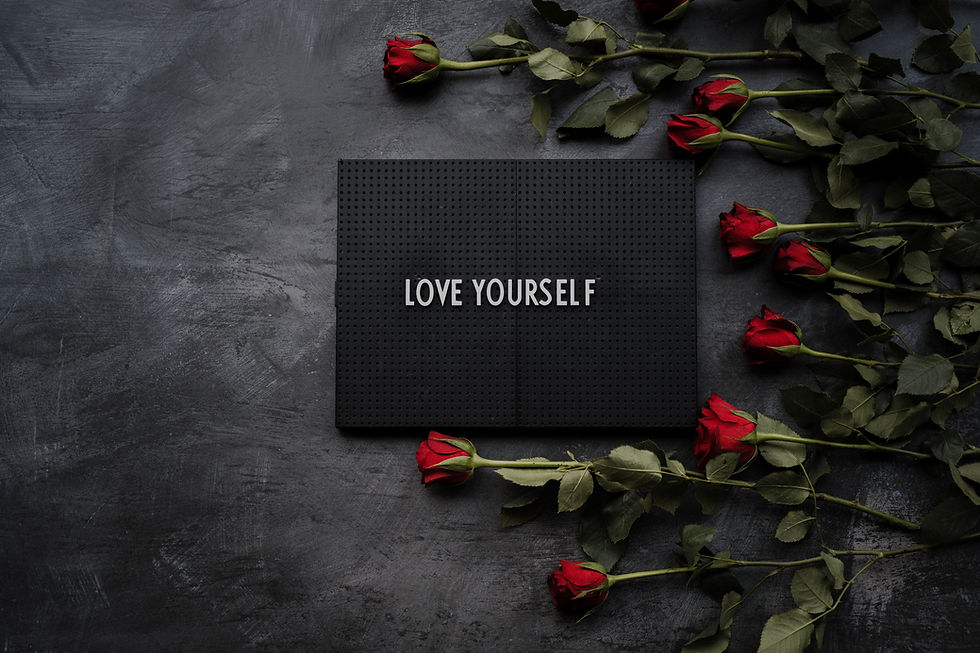The Gentle Art of Self-Compassion: Kindness Within
- Debbie Airth

- Mar 26
- 4 min read
Updated: Jul 14

After exploring the strength we find in resilience, let’s pause and shift inward, toward something that often feels harder than pushing through: being kind to ourselves.
That’s what self-compassion is.
It’s not about sugar-coating the hard stuff. It’s not self-pity or making excuses. It’s about meeting yourself in the thick of it with honesty and care, the same way you would show up for someone you love.
But let’s be honest: self-compassion doesn’t always feel natural.
For many of us, especially those raised to prize grit, independence, or performance, self-compassion can feel awkward, even uncomfortable.
Maybe you’ve been taught that being hard on yourself is how you get things done. That rest is laziness. That emotions are a liability.
I used to believe that, too.
I thought that to be strong, I had to push through everything, never let my guard down, and definitely not be soft with myself.
But over time, I learned something that changed everything:
Self-compassion isn’t the opposite of strength. It’s what makes strength sustainable.
It’s what helps you keep going without burning out. It’s what helps you grow without the crushing weight of shame.
And it’s what helps you feel human, not just functional.
The Misconceptions That Keep Us From Kindness
Let’s name a few common myths that make self-compassion feel off-limits, especially for those socialized to be “tough”:
Myth: Self-compassion is self-pity.
Self-pity keeps you stuck. Self-compassion helps you move forward. It says, Yes, this is hard… and I can face it.
Myth: It makes you lazy or complacent.
Research says otherwise. People who practice self-compassion are more motivated, more accountable, and more resilient, because they’re not stuck in a cycle of self-criticism.
Myth: It’s soft, weak, or indulgent.
In reality, it takes guts to face your pain with honesty and treat yourself with care instead of punishment. Self-compassion isn’t about lowering the bar. It’s about lifting the weight of shame so you can actually move forward.
Self-Compassion ≠ Giving Up
It’s the foundation of self-acceptance and real growth.
Self-acceptance doesn't mean settling. It means meeting yourself where you are so you can move forward with clarity.
You can still want change. You can still hold yourself accountable. You just don’t have to hate yourself in the process.
Self-compassion says:
“I made a mistake. And I’m still worthy.”
“This is hard. And I don’t have to face it alone.”
“I’m struggling. And that doesn’t mean I’m failing.”
It’s this kind of kindness that makes real change possible.
The Three Pillars of Self-Compassion
Think of self-compassion as a practice, a mindset built on three core pillars:
1. Self-Kindness
Speaking to yourself with gentleness instead of criticism. It’s like encouraging yourself as you would a friend, not in a fluffy, empty way, but with respect and care.
“I’m doing my best right now.”“This is tough, and I can get through it.”
2. Common Humanity
Knowing you’re not alone. Everyone makes mistakes or has a rough day. Struggle is part of being human, not a sign you’re broken.
“Other people feel this way, too. I’m not the only one.”
3. Mindfulness
Staying present with what’s hard, without getting swallowed by it. Naming what’s happening without judgment.
“This hurts right now. I don’t have to pretend it doesn’t.”
Practices to Build Your Self-Compassion Muscle
Here are a few ways to live self-compassion, even when it feels foreign:
🗣️ Self-Soothing Phrases
Try some of these out and see if they resonate with you. You don’t need to believe them fully at first, just practice saying them.
“I’m doing my best. That counts.”
“I’ve got my own back.”
“It’s okay to feel what I’m feeling.”
“I deserve my own kindness, too.”
🧠 Mindful Self-Compassion
If loving-kindness meditations feel too much, then simplify it:Think of what you’d say to a friend in your situation, then say it to yourself. Even just pausing to breathe and notice how you’re feeling is a powerful act.
📓 Journaling With Curiosity
Instead of judging yourself, get curious. Ask:
What do I need right now?
How would I speak to someone else going through this?
Where am I being harder on myself than I need to be?
🧍 Everyday Kindness
This isn’t about bubble baths (unless that’s your thing). It’s about real-time choices:
Taking a break when you're overwhelmed
Saying no without guilt
Eating when you’re hungry
Choosing rest without apology
Your Task: Try One Small Act of Self-Compassion This Week
This week, I invite you to practice one simple act of self-kindness each day.
Start with this phrase when things get hard:
“This is a tough moment.
Hard times are part of life.
I’ve got my own back.”
Notice how it feels. Awkward? Relieving? Uncomfortable? That’s okay. Keep going. Kindness is a skill, not a personality trait.
Resources:
This site has a fantastic guided self-compassion journey with eight short practices:
Here are some other self-compassion exercises to try out as well:
Closing Thoughts: Tough and Tender Can Coexist
Self-compassion doesn’t mean being soft.
It means being real. Honest. Courageous enough to stop fighting yourself and start caring for yourself, the way you deserve.
You don’t have to earn your worth by doing more, being better, or never messing up.
You’re already worthy. Just as you are. And from that place? You can grow into everything you’re becoming.
Up next: Reframing Negative Thoughts
We'll explore how to catch those harsh inner critics and shift toward more empowering, truthful ways of seeing yourself. You're not alone in this. Let’s keep going, together.



Comentários